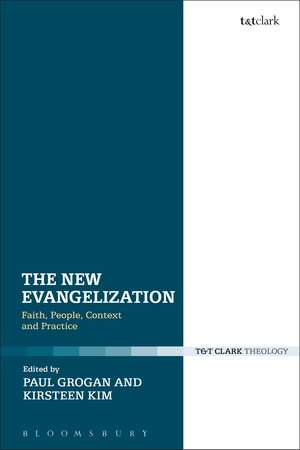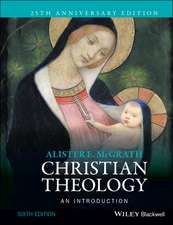The New Evangelization: Faith, People, Context and Practice
Kirsteen Kim, Paul Groganen Limba Engleză Paperback – 24 aug 2016
| Toate formatele și edițiile | Preț | Express |
|---|---|---|
| Paperback (1) | 258.96 lei 6-8 săpt. | |
| Bloomsbury Publishing – 24 aug 2016 | 258.96 lei 6-8 săpt. | |
| Hardback (1) | 775.43 lei 6-8 săpt. | |
| Bloomsbury Publishing – 25 feb 2015 | 775.43 lei 6-8 săpt. |
Preț: 258.96 lei
Preț vechi: 331.94 lei
-22% Nou
Puncte Express: 388
Preț estimativ în valută:
49.55€ • 51.97$ • 41.25£
49.55€ • 51.97$ • 41.25£
Carte tipărită la comandă
Livrare economică 01-15 aprilie
Preluare comenzi: 021 569.72.76
Specificații
ISBN-13: 9780567671851
ISBN-10: 0567671852
Pagini: 312
Dimensiuni: 156 x 234 x 17 mm
Greutate: 0.44 kg
Ediția:NIPPOD
Editura: Bloomsbury Publishing
Colecția T&T Clark
Locul publicării:London, United Kingdom
ISBN-10: 0567671852
Pagini: 312
Dimensiuni: 156 x 234 x 17 mm
Greutate: 0.44 kg
Ediția:NIPPOD
Editura: Bloomsbury Publishing
Colecția T&T Clark
Locul publicării:London, United Kingdom
Caracteristici
Analyses the challenges facing the New Evangelization in a culturally, religiously and socially plural age
Notă biografică
Mgr Paul Grogan, MA, is Chaplain of Leeds Trinity University, UK.Kirsteen Kim, PhD, is Professor of Theology and World Christianity at Leeds Trinity University, UK, and editor of Mission Studies.
Cuprins
Table of Contents1. IntroductionKirsteen Kim, Leeds Trinity University, UKPart I: Vatican II and the New Evangelization2. Vatican II, Non-Christian Religions and the Challenges for (New) Evangelization ProgrammesMathijs Lamberigts, Catholic University Leuven, Belgium3. From 'Mission' to 'Evangelization': The Latin American Origins of a Challenging ConceptJohn F. Gorski, National Office of the Pontifical Mission Societies, USA4. Christ, Culture and the New EvangelizationTracey Rowland, John Paul II Institute, AustraliaPart II: The Church of the New Evangelization5. The Church: A People Sent in MissionSusan K. Wood, Marquette University, USA6. The Ecclesiology of Communion: From Jurisdiction to RelationshipFrancis George, Archbishop of Chicago, USA7. Reading Unitatis Redintegratio with His Holiness Benedict XVI Roman Pontiff EmeritusPaul D. Murray, Durham University, UK8. Global Catholicism: Evangelization and a Networked ChurchIan Linden, School of Oriental and African Studies, UKPart III: The New Evangelization in Context9. The Growth of the Young Churches: From the First Evangelization to a Complex Ecclesial MaturityFernando Filoni, the Congregation for the Evangelization of Peoples of the Holy See10. The Journey of the Young Churches: An African PerspectiveRichard K. Baawobr, Superior General, Missionaries of Africa11. The New Evangelization and Other Religions: Facing Three Objections to Evangelization in Regard to the World ReligionsGavin D'Costa, University of Bristol, UK12. The New Evangelization and Other Religions: Proclamation and DialogueAnnemarie Mayer, Catholic University Leuven, BelgiumPart IV: Practising the New Evangelization13. The Catechism of the Catholic Church and the New EvangelizationPetroc Willey, Franciscan University, USA14. John Henry Newman and the New EvangelizationStephen Morgan, University of Oxford, UK15. Conversion to Christ: Teaching, Theology and Practice since Vatican IIAndrew Brookes, Blackfriars, UK16. Meeting God in Friend and Stranger: Making the Theology of Nostra Aetate Relevant for Teaching and Practice in England and WalesKatharina Smith-Müller, the Catholic Bishops' Conference of England and Wales17. ConclusionPaul Grogan, Chaplain at Leeds Trinity University, UK
Recenzii
The book provides an excellent overview of the current status of mission evangelization and, as such, can be used in a graduate level course on ecclesiology or missiology.
Grapples with a number of issues ... that are of interest to all Christians and enables non-Catholics to understand some of the debates that are taking place in the Catholic Church at the moment.
The perspectives in The New Evangelization: Faith, People, Context and Practice are very diverse; the essays come from Africa, the United States, the United Kingdom, Australia, and Belgium. The breadth of perspectives shows that the New Evangelization is not a neatly-packaged program that a local church can unveil and be guaranteed success by following the formula. . The text gives much clearer a sense to what the New Evangelization actually is.
This book is suffused with realism, serenity and hope. It helps us to see the powerful influence of the Holy Spirit in the Church in the decades after the Council. It charts how profoundly encouraging Papal teachings, increasingly effective catechesis, imaginative pastoral initiatives and a renewed spirit of engagement with the world have all contributed to a rediscovery of the Church's primary identity, namely that she "exists in order to evangelize" (Blessed Pope Paul VI, Evangelii Nuntiandi, 14).
Professor Kirsteen Kim and Msgr. Paul Grogan have offered in this volume an impressive collection of reflections on evangelization today. These reflections throw light on the New Evangelization, but also link it with other more traditional aspects of the church's evangelization mission, often in fresh and creative ways. This is a truly important work for anyone engaged in mission and mission studies today.
The New Evangelisation is a priority for the Church that is widely commended but little understood. This book opens it up for reflection and roots it not only in the Second Vatican Council but also in the movements that preceded it. Too few English speaking Catholics realise that France was declared to be a mission country in 1943. This book shows that during the Council the Church adapted to its already diminished position in the developed world and its growing role in the developing world, seeing dialogue with other faiths and cultures as integral to its mission in both these worlds
Grapples with a number of issues ... that are of interest to all Christians and enables non-Catholics to understand some of the debates that are taking place in the Catholic Church at the moment.
The perspectives in The New Evangelization: Faith, People, Context and Practice are very diverse; the essays come from Africa, the United States, the United Kingdom, Australia, and Belgium. The breadth of perspectives shows that the New Evangelization is not a neatly-packaged program that a local church can unveil and be guaranteed success by following the formula. . The text gives much clearer a sense to what the New Evangelization actually is.
This book is suffused with realism, serenity and hope. It helps us to see the powerful influence of the Holy Spirit in the Church in the decades after the Council. It charts how profoundly encouraging Papal teachings, increasingly effective catechesis, imaginative pastoral initiatives and a renewed spirit of engagement with the world have all contributed to a rediscovery of the Church's primary identity, namely that she "exists in order to evangelize" (Blessed Pope Paul VI, Evangelii Nuntiandi, 14).
Professor Kirsteen Kim and Msgr. Paul Grogan have offered in this volume an impressive collection of reflections on evangelization today. These reflections throw light on the New Evangelization, but also link it with other more traditional aspects of the church's evangelization mission, often in fresh and creative ways. This is a truly important work for anyone engaged in mission and mission studies today.
The New Evangelisation is a priority for the Church that is widely commended but little understood. This book opens it up for reflection and roots it not only in the Second Vatican Council but also in the movements that preceded it. Too few English speaking Catholics realise that France was declared to be a mission country in 1943. This book shows that during the Council the Church adapted to its already diminished position in the developed world and its growing role in the developing world, seeing dialogue with other faiths and cultures as integral to its mission in both these worlds















